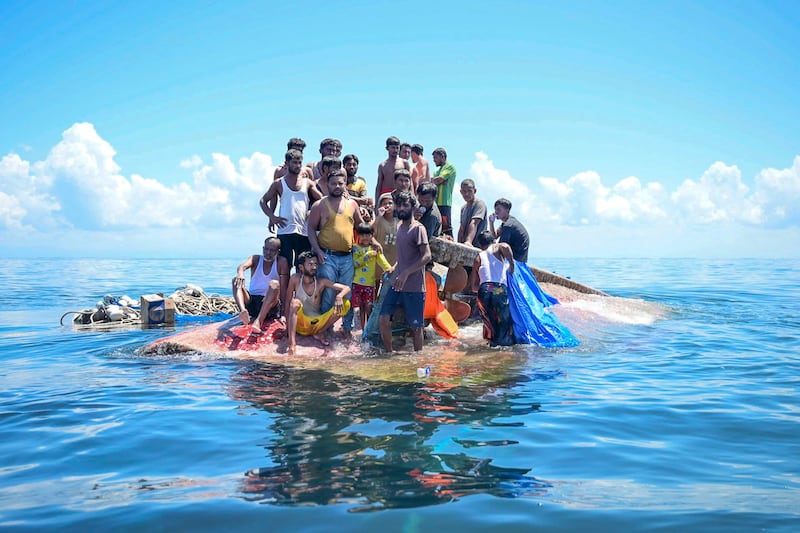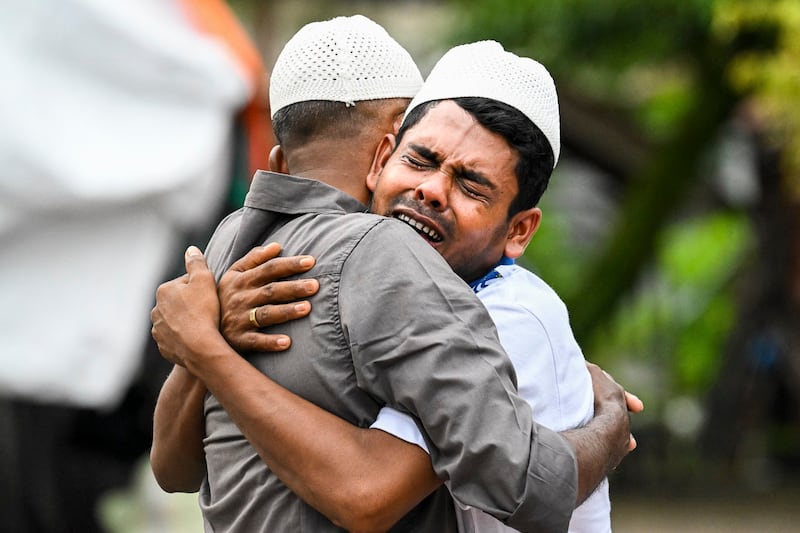Tun Khin is the president of the U.K.-based Burmese Rohingya Organization. A leading campaigner for Rohingya rights, he believes that the Rohingya people are being subjected to war crimes amid the conflict between the military and the ethnic Arakan Army, or AA, in western Myanmar’s Rakhine state.
While both sides are forcibly recruiting Rohingyas to join the fighting there, he says, the junta is systematically fueling hatred between ethnic Rakhines and the Rohingya people. The Rohingyas are not recognized as citizens of Myanmar by the government and have been the target of ethnic violence throughout history – including in 2017, when a military clearance operation in Rakhine state sent nearly 1 million fleeing into neighboring Bangladesh.
In an interview with RFA Burmese, Tun Khin expressed concern that the current situation in Rakhine state may fuel further violence against his people. He also addressed accusations by the military that he led a group of activists to Rohingya refugee camps in Bangladesh to recruit 50,000 soldiers for the AA.
The interview has been edited for length and clarity.
RFA: Firstly, I would like to ask about your team meeting with the Rohingya refugees in Bangladesh last month. The junta claimed that the goal of your visit was to recruit about 50,000 Rohingya refugees from Bangladesh for the AA. What is your response to this?
Tun Khin: We went to Bangladesh to meet our Rohingya people. They have been taking refuge there for almost seven years after escaping a genocide. Another reason for our visit was to meet with the Bangladeshi government. We also discussed the schooling of children, as well as the repatriation program [to bring the refugees back to Myanmar]. We have to go back to our country – it is our right.
However, Zaw Min Tun, the junta spokesperson, gave the wrong information. We neither met with the AA nor recruited soldiers for them. In fact, we just investigated the lives of Rohingya refugees in Bangladesh and worked to get more support for them.
RFA: The Rohingya people are being recruited for military service, while armed clashes are escalating in Rakhine state. What is your opinion on the current situation in Rakhine state?
Tun Khin: The current situation is very bad. I am worried that the situation will be even worse than in 2017. Since the beginning of the latest armed struggle in November 2023 [when the AA ended a ceasefire agreement with the military], the Rohingya people have been trapped between the AA and junta troops. Many Rohingyas died in airstrikes in Minbya [township] and other areas.

Especially after the AA took control of the village of Hpon Nyo Leik [in Buthidaung township], junta troops totally destroyed the village, despite its status as an IDP [internally displaced persons] village. Recently, the Rohingya people have been forced to serve in the military, and at least 500 from the refugee camp in [the Rakhine state capital] Sittwe were recruited for military service. There were also about 500 [recruited] in Buthidaung and Maungdaw townships.
The junta staged [Rohingya] protests against the AA. We believe that the junta is systematically working to create tensions between the Rohingya and the Rakhines. We all should be aware of that.
Meanwhile, the AA has illegally arrested Rohingyas … and killed innocent civilians in Maungdaw and Buthidaung. They accused them of cooperating with the junta regime and confiscated food and other goods from Rohingya villages. It is unacceptable.
We also have reports that the AA forcibly arrested and extorted money from Rohingyas to be exempted from military service. So our Rohingya people are in a very bad situation amidst the armed conflict.
AA control in Rakhine state
RFA: The AA is … taking over towns in Rakhine state. If the AA gains control of the entire state, what would happen to the Rohingya?
Tun Khin: The military is our common enemy. They beheaded and killed thousands of our Rohingya people in 2017. Thousands of Rohingya women were brutally raped. The Myanmar military burned more than 390 Rohingya villages. We have suffered all kinds of brutality from the army. So, we stand together with any group which is working to remove the military.
On the other hand, the AA is committing war crimes against the Rohingya people, who are already facing genocide, while it fights the military. They need to stop it. We see that hatred is spreading. We Rohingya just want to live together in peace.
RFA: The AA leaders don’t use the term “Rohingya” and instead use “Bengali” [which suggests the Rohingyas are from Bangladesh]. What do you want to say about that?
Tun Khin: We are not Bengalis. We are an original indigenous ethnic group in Rakhine state. We are Rohingya, and we expect to be called Rohingya. We have our own customs and cultures.
We are a group of people with our own characteristics. We are … the second largest ethnic group in Rakhine state. The AA needs to recognize this and practice mutual respect.

RFA: The military has equipped Rohingyas with weapons. Do you think that the Rohingyas are able to protect themselves?
Tun Khin: The military is giving weapons to the Rohingya, but using them as human shields … So, it is clear that the Rohingya cannot protect themselves.
Translated by Aung Naing. Edited by Joshua Lipes and Malcolm Foster.
